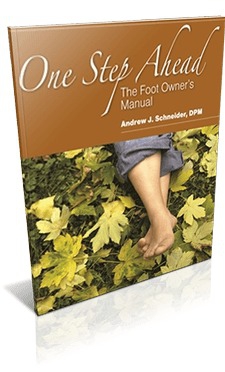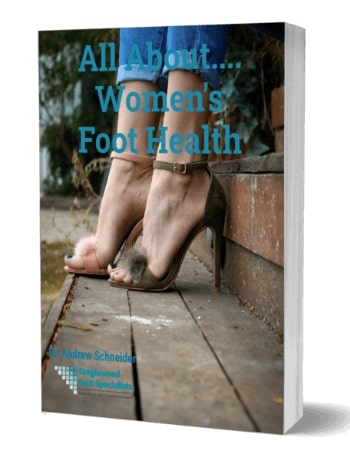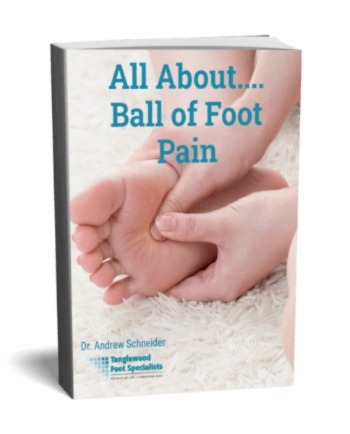Taking Control of Woman’s Foot Health…No More High-Heel Pain!
I know you love your high heels. I’m sure you’ve got a great collection in your closet. And I'm also sure those heels make a special outfit look even better. Except, you may not realize it, but even the perfect Louboutins can actually wreck your feet. In a real and lasting way, which doesn’t look pretty.
Think about it…your feet may already be telling you that there’s a problem. Do you have to kick off your shoes under your desk at work? When you’re out for dinner, are you running to sit down so you can slip out of your Manolos? Are you always the one walking out of the party barefoot, limping, with your heels in your hands?
These aren’t good signs, in case you didn't know it. But don’t worry, I’m here to help you find pain relief for your aching feet. Without expecting you to abandon your favorite Jimmy Choos! At the first sign of foot pain, contact our office for an immediate appointment.
High Heels and Foot Pain
 You may have a great shoe collection. But did you know that some of your favorite pairs could be
You may have a great shoe collection. But did you know that some of your favorite pairs could be
contributing to foot pain? It's true! Wearing them could even cause changes in your bone structure. I understand that it’s tempting to ignore the problem. Especially if you can find quick pain relief with a nice soothing foot soak and a day spent in running shoes.
But here’s the problem with that approach. Over time, what started as discomfort can progress to pain that can limit your activity. Think about it: would you keep wearing high heels if it meant no more CrossFit, Zumba or running trails? I’m guessing the answer is no.
Don't worry: with a little help from your podiatrist, you can keep wearing your favorite shoes. Without suffering long term damage to your feet. The key is to identify the cause of your foot pain. And to provide appropriate treatment before bigger problems develop.
Women’s Foot Health Challenges
Both men and women develop painful foot conditions. But as a woman, your body and lifestyle choices put you at higher risk for some issues. My female patients experience these foot conditions more often than their male counterparts:
Morton’s Neuroma Diagnosis for Women
A Morton's neuroma is a condition where the nerve in the ball of your foot becomes inflamed. This inflammation occurs because nearby bones and ligaments compress your nerve. Sometimes, that’s a result of your individual body structure. But narrow, pointy-toed shoes can add to the pressure. Which ups the nerve’s inflammation and adds to your pain.
Stress Fractures are a Women’s Health Concern
Women are more likely to develop stress fractures for two key reasons. First, wearing shoes with high heels causes your center of gravity to shift forward. And that increases the amount of stress that’s placed on the front of your foot. But that’s not all. This unnatural pressure distribution makes your bones ‘tired.’
At some point, overworking the bone will lead to a fracture, causing pain and swelling.
So, that’s the lifestyle factor that increases your risk of stress fractures as a woman. Another reason why women are so vulnerable to stress fractures? You’re also more vulnerable to conditions involving calcium deficiency, osteopenia, or osteoporosis. And these women’s health concerns weaken your bones, elevating your risk for a broken bone.
Bunions are a Symptom of High Heels
 Many women blame their bunions on poor shoe choices. But that only tells part of the story. A bunion develops when you experience prominent bone growth on the side of your big toe joint. Which leads to a painful bump forming. It also leaves you with pain and pressure when you put on your shoes. Especially those cute-and-pointy Sam Edelman high heels.
Many women blame their bunions on poor shoe choices. But that only tells part of the story. A bunion develops when you experience prominent bone growth on the side of your big toe joint. Which leads to a painful bump forming. It also leaves you with pain and pressure when you put on your shoes. Especially those cute-and-pointy Sam Edelman high heels.
Bunions can also make your big toe joint less flexible. This leads to joint pain, especially when you get back in your favorite pair of high heels. Shoe choice can increase your bunion risk, but genetics play their part as well. In other words, if your mother and grandmother had bunions, you have a higher risk. That means we should check in on your foot health regularly. That way, we can catch problems as early as possible.
You see, early intervention is the key to successful, minimally invasive bunion treatments. Some bunions need to be corrected with surgery. But we can stop small bunions with less invasive interventions. So don't wait to schedule your bunion consultation appointment in our office.
Women’s Hammer Toe Podiatrist
Just like bunions, women have two major risk factors when it comes to hammer toes. This condition typically develops because of a mechanical instability in your body. But it’s also made worse by the shoes you choose to wear.
When you develop hammer toes, your toes actually buckle up and develop a bend. Hammer toes ruin the look of open-toed shoes or sandals. And they hurt, too! Plus, it can lead to other foot problems.
You see, as your toes buckle, their center elevates. This means your toes touch the top of your shoes, which can cause a corn to form on your skin.
When it comes to hammer toes, early intervention is the key to getting back those pretty feet. Because, when caught in early stages, non-surgical hammertoe treatments are extremely effective. But left alone, advanced cases of hammertoes may leave you needing surgery.
How Can Your Feet Stop Hurting While Wearing High Heels?
 The reason that your feet hurt so much in high heels is because of the mechanical changes you’re forcing on them. Your entire center of gravity shifts forward. The majority of your weight is placed on the forefoot and your toes. That’s why you’re so at risk of developing bunions, hammer toes, and Morton’s neuroma.
The reason that your feet hurt so much in high heels is because of the mechanical changes you’re forcing on them. Your entire center of gravity shifts forward. The majority of your weight is placed on the forefoot and your toes. That’s why you’re so at risk of developing bunions, hammer toes, and Morton’s neuroma.
There is a way, however, to provide stability and efficiency to your feet. Even when you’re wearing your favorite high heels. That is with the use of a custom orthotic.
A custom orthotic? Isn’t that a big clunky insole that only fits into a running shoe? While that might have been the case in the past, it is no longer so. In fact, an orthotic for a running shoe is light and streamlined and doesn’t fill up too much of the shoe. An orthotic for a high heel is even slimmer and works great to provide you the support you need in the shoes you love.
A custom orthotic is one way that I can address your foot pain. It’s also the most successful. My patients report that they are able to wear shoes that have been too painful to wear. That’s exactly what a properly made orthotic should do for you.
The Houston Women's Foot Doctor
If you have foot or ankle pain, don't wait around for it to get better. Schedule an immediate appointment with your Houston women's podiatrist Dr. Andrew Schneider. I'll assess your condition and find your pain relief solution. And I'll do my best to get you back to the activities that you love. Not to mention the shoe collection you can't bear to part from.






















